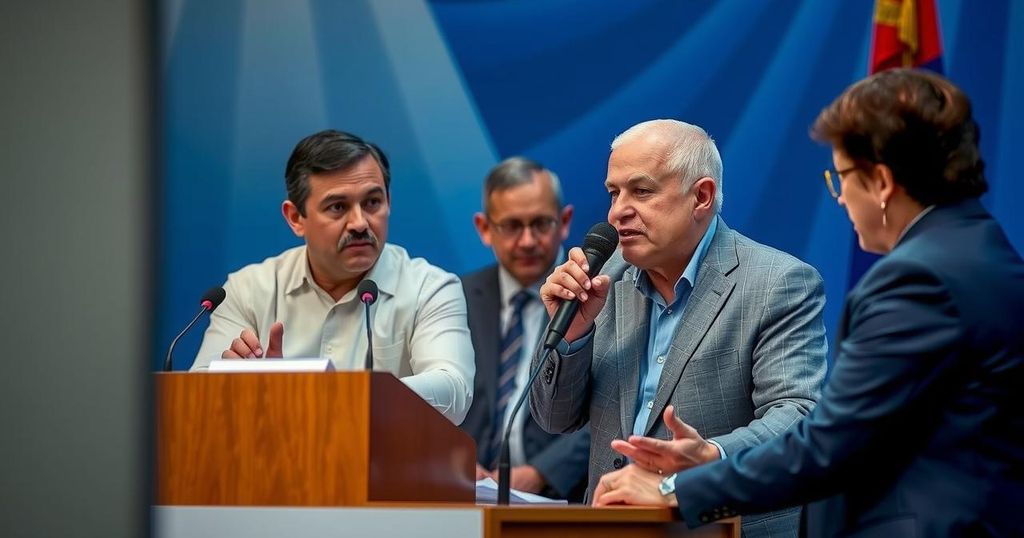Uruguay held a presidential election characterized by two moderate candidates amid high voter turnout. The election reflected stability in stark contrast to regional turmoil, as the electorate focused on a social security referendum and pressing social issues. Despite some divisions, the overall political atmosphere remained calm and consensus-driven, highlighting citizens’ engagement in the democratic process.
In Montevideo, Uruguay, voters participated in a significant election on Sunday, selecting a new president amid a race characterized by two moderate candidates who echo the nation’s longstanding tradition of political stability. The election marked the conclusion of a contest between the conservative coalition led by the incumbent and a center-left alliance, engaging approximately 2.7 million eligible voters who also deliberated on parliamentary seats and a controversial referendum regarding the social security system. Turnout exceeded 88 percent, bolstered by the country’s mandatory voting laws. Election results were anticipated shortly after polls closed. The social security referendum, which proposes to reshape pension funding by lowering the retirement age and increasing benefits, has garnered considerable attention, overshadowing other pressing campaign issues such as child poverty, education, and security. Observers note that widespread agreement on policy issues renders drastic changes post-election unlikely in this nation of 3.4 million, known for its robust democratic framework. Political analyst Juan Cruz Díaz remarked on Uruguay’s relative tranquility compared to its neighbors, saying, “In a way, Uruguay has been boring, but boring in this sense is very good.” As Argentina and Brazil grapple with political volatility and anger toward the status quo, Uruguay’s electorate appears content with its business-oriented policies and stable economic performance. President Luis Lacalle Pou maintains a respectable 50 percent approval rating. Voter engagement was notably different from what is observed in many other areas, with campaigns devoid of hostile rhetoric and personal attacks. The voting day atmosphere on Montevideo’s vibrant Rambla was festive, as supporters of various parties celebrated peacefully. Álvaro Delgado, the candidate of the ruling party and a former chief of staff, expressed his pride in Uruguay’s democratic processes after casting his ballot. His principal opponent, Yamandú Orsi, a center-left contender with a strong historical background and former mayor, has emphasized the nation’s continued commitment to democracy. “Uruguay has had the happiness for 40 uninterrupted years … the happiness that our citizens can elect their leaders,” he stated. Orsi also enjoys the backing of former President José “Pepe” Mujica, who remains an influential figure in Uruguayan politics despite health challenges. In a distant third place is Andrés Ojeda, a young candidate aiming to appeal to disaffected voters through innovative campaign strategies. The elections have raised concerns about rising crime and poverty, prompting discussions on security policies from both major coalitions. Beyond the presidential race, the referendum on overhauling the social security system has stirred debate, with the powerful labor unions backing a proposal that would impose significant fiscal changes. Both leading candidates have expressed reservations about the initiative, citing potential market repercussions. As the electoral process unfolds, Uruguayan citizens demonstrate their investment in democratic engagement, while analysts point to a notable voter indifference attributed to a lack of distinction between the political platforms. This election illustrates Uruguay’s unique political landscape in the context of a region often defined by strife and division.
Uruguay has a history of political stability and democratic governance, especially when compared to other Latin American nations. Its electoral processes are marked by compulsory voting and a tradition of civil engagement, which results in high voter turnout. This election is taking place amidst regional turbulence, where countries like Brazil and Argentina have faced deep divisions and significant political turmoil. The political landscape in Uruguay presents unique moderate candidates, differing drastically from the heightened rhetoric and aggressive campaigning seen in neighboring countries.
The recent presidential election in Uruguay showcased a unique political environment amidst a backdrop of regional instability, featuring moderate candidates from both conservative and center-left coalitions. The high voter turnout reflects a deeply ingrained commitment to democratic values among the Uruguayan populace. While the outcome is unlikely to prompt significant changes in governance, the attention on the social security referendum and other pressing societal issues illuminates the dynamic political discourse that continues to unfold in the nation.
Original Source: www.pbs.org






